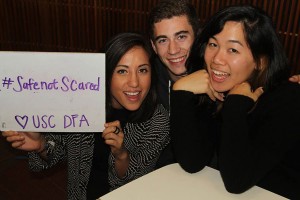Safe not SCared aims to change views on mental illness
Mental illness is an issue that is often misunderstood. But Tyler Matheson, a freshman business administration major, and a group of other students are working hard to change that.

Team effort · Members of Safe not SCared, from left to right: Bianca Nasser, Tyler Matheson and Jen Pongsai, came together after noticing a lack of satisfactory help available to students suffering from mental illness. – Photo courtesy of Tyler Matheson
These students initiated Safe Not SCared, a campaign that aims to empower students suffering from mental illness and give them a voice in a culture that neglects their silence.
“I’ve had a long history of mental illness, and I know that if some people like me came here, they wouldn’t like the university’s culture,” Matheson said. “I feel that USC has a responsibility and an obligation to provide for those afflicted with mental illness. We’ve been ignored for a long time, and if there’s a time for that to change, it’s right now.”
Safe Not SCared, set to launch in January 2015, is a Design for America project aimed at using public art as a means to start conversations and offer new perspectives on the issue of mental health. The group is planning to create several types of artistic media that address psychological problems.
“We’re going to start with something stationary that people can look at,” Matheson said. “We figured that engagement is our best option so right now we have a polling station. From the results, we’ll create a mental health profile of USC on a big wall.”
The campaign will also maintain an online presence on social media in order to make content engaging for its audiences.
“What we want to do is create a splash board that acts as a social media aggregator,” Matheson said. “We’ll have a Safe Not SCared hashtag, and it will display all our content. We’ll also feature some documentary-like vignettes of us talking to people, asking them what it’s like to have mental illness and how the culture of USC has affected them. We want to use this page to pitch our ideas to the administration as well.”
Safe Not SCared is also planning to establish peer support groups to create a caring community for people suffering from mental illness. It already has strong backing from the Panhellenic Council and hopes to also address mental health issues in the Greek community.
At their essence, all of Safe Not SCared’s programs are focused on one goal: changing the way mental illness is perceived on campus.
“It’s viewed as a flaw in somebody,” Matheson said. “It’s kept under the table as much as possible, and you have a lot of victims who feel ashamed that they have it and don’t want to bring it out and talk about it at all.”
Matheson believes that the stigma surrounding mental illness causes students to avoid treatment. Based on his experience, Matheson considers that the services offered by USC aren’t aimed at those with deep psychological issues.
Ultimately, Matheson hopes the university can take a stronger approach toward providing effective mental health services to students in need, especially when, according to the National Alliance on Mental Illness, one in four students suffer from a form of mental illness on college campuses.
“We definitely want a revamping of their treatment style in order to help that minority who do not necessarily respond to the short-term counseling that Engemann [Student Health Center] has right now.”
Though Matheson is optimistic about the campaign’s future, he and his team recognize that they will need to overcome significant obstacles along the way.
“The biggest obstacle that I foresee is apathy from USC students,” Matheson said. “The reason for that is that we’re fighting against the culture of shame and neglect. The biggest fear I have is that we’re not going to get enough participation. Everybody knows someone who has suffered from mental illness, so we hope that drives people to take the first step.”
Matheson and his team want their campaign to prompt people in need to seek help. Only then will they consider Safe Not SCared to be a success.
“When it comes down to it, what we characterize as a success is at least one person showing up to a peer support group,” Matheson said. “If we can change the mind of one person to seek help, that is a success for us. The culture of shame makes resources at the Health Center invisible. It takes a lot to ask for help.”
Students who wish to learn more about Safe Not SCared can contact Matheson and his team via the USC Design for America Facebook page.

